Charlotte Smith – NPIF Innovation Placement Programme

Taking part in the NPIF Innovation Placement Programme gave me an opportunity to work with the Forest Stewardship Council (FSC); pioneers of forest certification, who promote the responsible and sustainable management of the world’s forests. I joined the Data, Analytics, Evaluation and Learning team (iDEAL) at the very start of an ambitious project to revolutionise how FSC record, store and analyse data. The project would introduce digital audit reporting, enabling the FSC to aggregated and analyse data to identify trends, impacts and risk areas. The aim was to replace an outdated system involving the submission of PDFs with inconsistent data formats. This old system, was not only impractical but also prevented FSC from efficiently analysing their certification data and rendered them unable to assess the impact of their work. The project’s intended output was an online data capture tool; a new generation of technology built to radically improve productivity by modernising the way certificate bodies collect and submit audit data.
My role within iDEAL was to analyse the current procedure and the FSC Certification Standard in order to produce a uniform template for future data collection. It was an iterative process in which I synthesised the entire FSC Standard to identify all the necessary data fields and produce algorithms to convert measurements into standard units. This placement was an exciting opportunity to help transform a concept into a useful and effective tool. I was able to draw on my previous experience working in software development to create the template in such a way that it could be easily converted into a database. This involved meticulously planning the template fields, datatypes and data restrictions. A major goal of the project was to ensure that we were lightening the data collection burden on certificate bodies. I worked directly with these stakeholders to understand the variety of methods they currently use and the concerns they had about adopting a new system. Based on this research, I worked to ensure there was no duplicate data entry and designed the template such that the multitude of end reports could be produced from the fewest possible fields.
The placement offered opportunities for knowledge exchange in both directions. I was able to use the skills I have developed in academia, research, and my previous career, whilst simultaneously gaining experience engaging with stakeholders, witnessing forestry in a commercial setting and gaining an understanding of how policy is applied. Although I had worked with FSC before, it is a large, international organisation and the recently established iDEAL team was entirely new to me. The placement saw me working with a number of international teams both within FSC and externally, enabling me to build an extended network within the forestry community. I experienced how forestry policy is implemented and gain invaluable insight into how NGOs and commercial organisation rely on impact data to demonstrate outcomes of socio-economic policies. This first-hand knowledge of putting policy into action will be invaluable as I continue with my thesis, which is intended to directly impact policy decisions.
Prior to starting my PhD I had planned a career in academia, with the intention of following the traditional route from student through post-doc into lecturer and beyond. However, as I re-immersed myself in the academic world, I found myself missing certain aspects of professional life and contemplating whether being an academic was actually what I wanted. When these placements were advertised, I saw an opportunity to explore how I might merge the two career paths. Participating in the placement confirmed to me that I wanted a dynamic career, hybridising academia and business. I now plan to follow a path which enables me to continue learning and developing new knowledge, but has more opportunities for direct application than a purely research-based role, whilst allowing me to retain my environmental focus. From discussions with my line manager when we were building the work plan, I knew what opportunities the placement would offer, but I had no idea how influential it would be in terms of deciding the direction of my future career. It was an invaluable exercise for exploring my thoughts, concerns and confusion around the path I want my career to follow. It gave me the experiences I needed in order to make educated decisions for the future and I would highly recommend it to anyone who is experiencing a similar dilemma.
